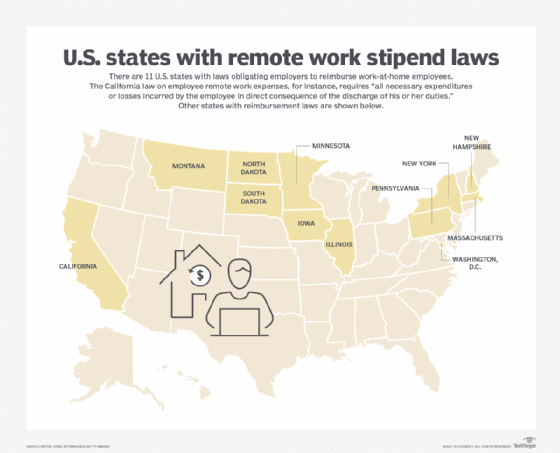Remote Employee Laws in California Explained
As remote work becomes more prevalent it’s essential for both employers and employees to grasp Californias remote employee laws. The state has taken the lead in establishing rules that tackle the intricacies of working from home ensuring that these arrangements are both equitable and safeguarded. These regulations aim to uphold employees rights while providing the convenience of working remotely.
Californias laws for remote employees cover aspects such as pay and hour rules, workplace safety and employee rights. These laws guarantee that employees working from home are afforded the same safeguards as those in a conventional office environment. With a focus on striking a balance between the advantages of remote work and upholding fair labor standards the states forward thinking approach seeks to protect workers, regardless of their work location.
California’s Telecommuting Regulations

In California the rules for working from home outline the duties of both employers and employees. These regulations make sure that remote work follows labor laws and also offer a structure for effectively overseeing remote workers.
Here are some key aspects:
- Wage and Hour Laws: Remote employees must be paid according to California’s minimum wage and overtime laws. Employers must accurately track hours worked, even if employees are working from home.
- Meal and Rest Breaks: Just like in a traditional office setting, remote employees are entitled to meal and rest breaks. Employers must ensure that these breaks are provided as per California labor laws.
- Non-Exempt vs. Exempt Employees: The distinction between exempt and non-exempt employees remains important. Non-exempt employees must be paid overtime for hours worked beyond 40 in a workweek, while exempt employees are not entitled to overtime.
Based on what I’ve seen dealing with these rules can be quite challenging. Its crucial for employers to keep themselves informed about any legal updates and for employees to know their rights to have a seamless remote work experience.
Workplace Safety Requirements for Remote Employees

Making sure the workplace is safe isn’t limited to the physical office; it also applies to remote work settings. In California employers are required by law to take measures to ensure that remote work conditions meet safety and health standards.
Key safety considerations include:
- Ergonomic Setup: Employers should guide employees on setting up their home office ergonomically to prevent strain and injuries. This includes proper seating arrangements and desk setups.
- Equipment and Maintenance: Employers may be required to provide or reimburse for necessary equipment such as computers, ergonomic chairs, and desks. Regular maintenance and safe use of equipment are also crucial.
- Emergency Procedures: Even when working from home, employees should be informed about emergency procedures, including how to handle accidents or health issues that may arise while working remotely.
Based on what I’ve seen putting these safety protocols in place not only supports efficiency but also safeguards the health of remote employees. It’s a minor expenditure that can bring about advantages, in employee contentment and productivity.
Employee Rights and Protections
The rise of work has brought changes to how employee rights and safeguards are upheld in California. Even with the separation employees have the right to a range of protections to ensure fair and respectful working conditions. It’s not solely about the tasks they perform but also about the treatment they receive during the process.
Here are some important rights and safeguards for employees working remotely.
- Right to Privacy: Employees working from home still have a right to privacy. Employers must avoid invasive monitoring or surveillance of their home environment.
- Anti-Discrimination Laws: Remote employees are protected against workplace discrimination based on race, gender, age, or disability, just as they would be in an office setting.
- Equal Pay: California laws mandate that remote employees must receive equal pay for equal work, regardless of their work location.
- Family and Medical Leave: Employees are entitled to family and medical leave under state and federal laws, which extends to those working remotely.
Based on my experiences knowing about these rights can be really empowering. When I switched to working from home being aware of these protections gave me a sense of security and support. Its crucial for both employers and employees to acknowledge and respect these rights to create a positive remote work atmosphere.
Compensation and Reimbursement Guidelines
Compensation and reimbursement play a role in remote work sparking curiosity. California has established rules to safeguard fair compensation for remote employees and to ensure that any expenses incurred while working from home are appropriately handled.
Here’s a breakdown of the key guidelines:
- Fair Compensation: Remote employees must be compensated according to California’s wage laws, including overtime pay for hours worked beyond the standard workweek.
- Expense Reimbursement: Employers are generally required to reimburse employees for reasonable and necessary expenses incurred while performing their job. This can include costs for internet, phone bills, and office supplies.
- Home Office Stipends: Some employers may offer stipends or allowances to cover home office setup costs. It’s essential to have clear agreements on what expenses are covered.
As I embarked on my path as a remote employee figuring out compensation and reimbursements proved to be quite an educational experience. Open dialogue with my employer regarding the expenses that would be reimbursed and gaining clarity on my entitlements helped streamline the process and enhance transparency.
Handling Remote Work Policies and Agreements
Establishing and overseeing remote work guidelines and contracts is essential to ensure clear communication and prevent any potential misinterpretations. These guidelines serve as a foundation for the way remote work is carried out and outline the expectations for both parties involved.
Managing remote work policies effectively involves.
- Clear Guidelines: Develop comprehensive policies outlining work hours, communication expectations, and deliverables. This helps in setting clear expectations for remote employees.
- Written Agreements: Formalize remote work arrangements through written agreements. These should detail the terms of employment, equipment provision, and any specific remote work requirements.
- Regular Reviews: Regularly review and update remote work policies to ensure they remain relevant and effective as circumstances and technologies evolve.
Based on my past encounters having policies and agreements in place can help prevent various problems. When I began working from home a solid agreement played a role in avoiding confusion and creating an atmosphere. For both employers and employees clear guidelines are essential for fostering a remote work partnership.
Implications for Employers and Employees
The shift to remote work has changed the way employers and employees interact with each other introducing a range of implications that require careful navigation by both sides. Employers face challenges and opportunities in managing a remote team while employees need to adjust to a work setting and a new set of expectations.
Here are some key implications:
- Increased Flexibility: Remote work offers flexibility that can enhance work-life balance. For employees, this means more control over their schedules. Employers benefit from potentially higher employee satisfaction and productivity.
- Communication Challenges: Remote work can sometimes lead to communication barriers. Employers must invest in effective communication tools and strategies to ensure that team collaboration remains strong.
- Data Security: With remote work, there’s an increased need for robust data security measures. Employers must ensure that their remote workforce adheres to security protocols to protect sensitive information.
- Cost Savings: Remote work can reduce overhead costs related to office space and utilities. However, employers might need to invest in technology and resources to support remote work effectively.
Based on what I went through the transition to working from home was a process for both my boss and me. We had to get used to using tools and adjusting our work routines. Being open to the flexibility and finding ways to improve communication were crucial in making it work well.
Recent Changes and Updates in Remote Work Legislation
With the evolution of remote work comes a need for updates in the laws that regulate it. California has introduced changes to its remote work legislation to tackle new challenges and requirements. Keeping up with these developments is crucial for employers and employees alike to ensure adherence to the rules and safeguard their rights.
Some recent updates include:
- Remote Work Taxation: New regulations have clarified the tax implications of working from different locations. Employers need to be aware of how remote work affects state and local tax obligations.
- Home Office Safety: Updated laws now include more detailed guidelines on ensuring home office safety, including ergonomic standards and equipment maintenance.
- Employee Classification: Changes in classification rules for remote workers ensure that employees are correctly classified as exempt or non-exempt, affecting their eligibility for overtime and other benefits.
- Data Privacy: Enhanced data privacy regulations require stricter measures to protect remote employees’ personal and professional data from breaches.
Looking back on these changes it’s evident that adjusting to new rules can be tough yet essential. Keeping myself informed about legal updates has assisted both me and my company in managing the intricacies of remote work more smoothly.
Frequently Asked Questions
Working from home often brings up a lot of questions, both in terms of practicality and legality. Here are some of the frequently asked questions along with their responses.
- What are the key rights of remote employees? Remote employees are entitled to privacy, anti-discrimination protections, fair pay, and family leave, similar to those working in a traditional office.
- How should employers handle remote work expenses? Employers are generally required to reimburse employees for necessary work-related expenses. This includes costs for internet, phone bills, and home office equipment.
- What are the best practices for remote work policies? Effective remote work policies should include clear guidelines on work hours, communication expectations, equipment use, and performance evaluations. Regular reviews and updates are also important.
- How do recent changes in legislation impact remote work? Recent updates affect tax obligations, home office safety standards, employee classification, and data privacy, requiring both employers and employees to adapt to new legal requirements.
Throughout my personal experience, I have found these frequently asked questions to be extremely helpful in navigating the challenges of remote work. By addressing these concerns in advance we can enhance the efficiency and overall satisfaction of remote work arrangements for all parties involved.
Conclusion
Grasping the laws governing remote employees in California is crucial for fostering a compliant and efficient remote work setting. The guidelines pertaining to telecommuting, employee entitlements and workplace safety ensure that both employers and employees can navigate this evolving work landscape with assurance. Balancing the advantages of remote work such as flexibility and cost efficiency with the challenges of communication and data security requires careful management. Nevertheless by establishing policies and staying informed about legal developments remote work can prove to be a mutually beneficial arrangement for all parties involved. Drawing from my own journey embracing these regulations and adapting to changes has made my remote work experience smoother and more rewarding.


